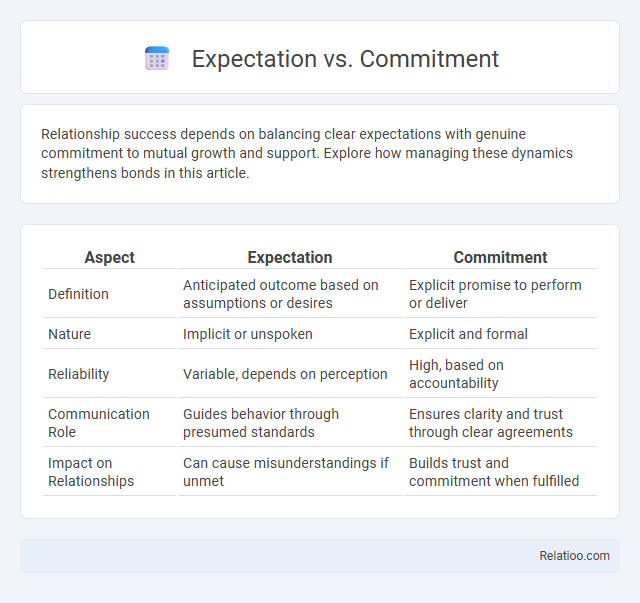Relationship success depends on balancing clear expectations with genuine commitment to mutual growth and support. Explore how managing these dynamics strengthens bonds in this article.
Table of Comparison
| Aspect | Expectation | Commitment |
|---|---|---|
| Definition | Anticipated outcome based on assumptions or desires | Explicit promise to perform or deliver |
| Nature | Implicit or unspoken | Explicit and formal |
| Reliability | Variable, depends on perception | High, based on accountability |
| Communication Role | Guides behavior through presumed standards | Ensures clarity and trust through clear agreements |
| Impact on Relationships | Can cause misunderstandings if unmet | Builds trust and commitment when fulfilled |
Understanding Expectation vs Commitment
Expectation involves anticipating specific outcomes based on hopes or assumptions, while commitment requires a conscious decision to dedicate effort and resources toward a goal. Understanding expectation versus commitment highlights the difference between passive hopes and active responsibility. Clear communication and mutual agreement are essential to align expectations with genuine commitments in personal and professional relationships.
The Psychological Basis of Expectations
Expectations are mental predictions about future events based on past experiences and social conditioning, while commitments involve a conscious decision to uphold specific actions or promises. The psychological basis of expectations lies in cognitive processes such as anticipation and schema formation, which guide individuals in predicting outcomes and preparing responses. Understanding the distinction between expectations and commitments helps manage emotional responses and align behavior with realistic goals.
The Power of True Commitment
True commitment drives sustained action beyond initial expectations, transforming goals into tangible results. While expectations set a hopeful vision, commitment fuels resilience and consistency needed to overcome obstacles. The power of commitment lies in its ability to convert intentions into achievements through unwavering dedication and persistence.
How Expectations Shape Behavior
Expectations act as mental frameworks that influence how individuals interpret situations and guide their behavior toward desired outcomes. When your expectations are clearly defined, they set a standard for performance and interaction, shaping motivation and decision-making processes. Commitment reinforces these expectations by creating a sense of responsibility, which further drives consistent actions aligned with anticipated results.
Commitment as a Driver of Success
Commitment serves as a crucial driver of success by transforming expectations into consistent actions and tangible outcomes. Unlike mere expectations, which rely on hope or anticipation, commitment demands dedication, accountability, and perseverance toward set goals. High levels of commitment correlate with enhanced productivity, goal achievement, and sustained motivation in personal and professional contexts.
Expectation vs Commitment in Relationships
Expectation in relationships often involves anticipating certain behaviors or outcomes from your partner, which can lead to disappointment if unmet. Commitment, however, is a conscious decision to remain dedicated and supportive regardless of circumstances, fostering trust and stability. Understanding the difference between your expectations and your partner's commitments helps build stronger emotional resilience and mutual respect.
Overcoming the Trap of Unrealistic Expectations
Unrealistic expectations often lead to frustration and disappointment, making it essential to align your commitments with attainable goals. Understanding the difference between expectation, commitment, and reality allows you to set clear, achievable objectives that foster growth and satisfaction. Overcoming the trap of unrealistic expectations requires honest self-assessment and ongoing adjustment of your commitments to match practical outcomes.
Building Lasting Commitment in Goals
Building lasting commitment in goals requires aligning your expectations realistically with clear, actionable plans. Understanding the difference between expectation--a desired outcome--and commitment--the dedication to consistent effort--helps maintain motivation through challenges. Your sustained focus and adaptability reinforce long-term success, transforming initial hopes into achievable milestones.
Balancing Expectation and Commitment
Balancing expectation and commitment is crucial for achieving personal and professional success. Your expectations set the goals and desired outcomes, while commitments represent the actions and dedication required to meet those goals. Aligning clear expectations with realistic commitments ensures sustained motivation and prevents burnout.
Practical Strategies for Shifting from Expectation to Commitment
Shifting from expectation to commitment involves cultivating clear goal-setting techniques and embracing accountability mechanisms that reinforce consistent actions. Practical strategies include breaking down objectives into manageable tasks, establishing deadlines, and regularly tracking progress to maintain focus and motivation. Emphasizing personal responsibility and aligning daily behaviors with long-term vision transforms passive hopes into active, sustained dedication.

Infographic: Expectation vs Commitment
 relatioo.com
relatioo.com